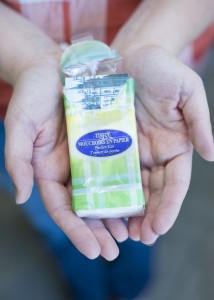
Some 19 people in Sunday dress stood outside the Conference Center in downtown Salt Lake City and handed out small packets of tissues to women going into the meeting. Ministry leader Keith Walker said his group came prepared to distribute 10,000 tissue packets.
“When they handed it to me, I thought it was really nice of them,” Shenay Aguilar, a music therapy major from Utah State University, said.
But the tissue packs had detracting religious messages concealed inside. Some of the packets were tucked away in pockets and purses and went into the building unnoticed. Security workers confiscated some of the packets when purses were opened for security checks.
“As we’re standing in line waiting to go in, the word is catching on that there’s anti-Mormon literature,” Marquie Meier recalled. “It was mostly shock and trying to spread the word.”
Meier, a sophomore studying communication disorders, from West Valley City, initially thought the gesture was an act of kindness. She and her family soon discovered cards concealed in the middle of the tissue packets.
“Trying to deceive ladies into taking something, I think, is just wrong. You shouldn’t try to deceive other people,” said Meier.
Aguilar had a similar reaction. “I think it was pretty rude of them … considering who they were trying to do this to,” she said.
“I saw a lot of people didn’t even acknowledge it; they just threw them away,” Aguilar said.
Walker said his group is not anti-Mormon, but his website labels the LDS Church as a cult. “We are a missionary organization that reaches out to Jehovah’s Witnesses and Mormons,” he said.
Walker wouldn’t say whether his group will return for the upcoming General Conference weekend. “If we had something planned like that, it wouldn’t exactly be in our best interest to let that be public.”




